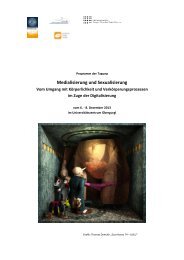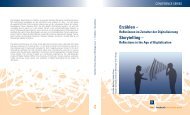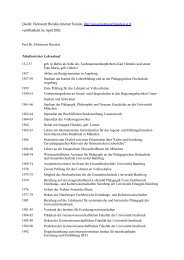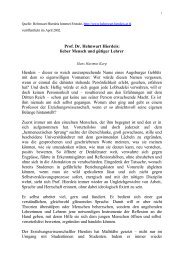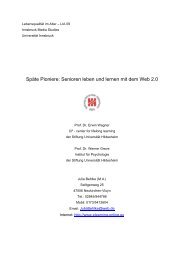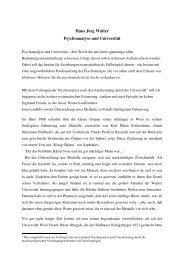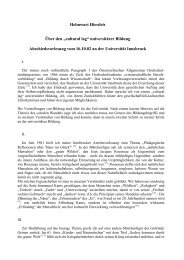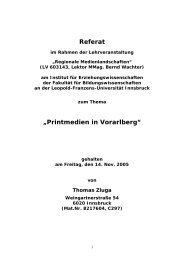Download pdf - Universität Innsbruck
Download pdf - Universität Innsbruck
Download pdf - Universität Innsbruck
Sie wollen auch ein ePaper? Erhöhen Sie die Reichweite Ihrer Titel.
YUMPU macht aus Druck-PDFs automatisch weboptimierte ePaper, die Google liebt.
82 Manuela Farinosi & Leopoldina Fortunati<br />
The important role played by the choice to adopt familiar tools such as Facebook and<br />
GoogleDocs instead of tools specifically developed for educational purposes, is something<br />
that is worth researching and discussing further. The digital generation spends a lot of time<br />
in these online spaces for online conversations and sharing content; so, nowadays it is possible<br />
to reflect on how to integrate and exploit the potential benefits of social media for<br />
educational purposes.<br />
Positive results also emerged from students’ online collaboration and sharing practices.<br />
Especially, students’ communication, socialization and organization significantly benefited<br />
by the application of these kinds of tools (Facebook and GoogleDocs) inside the educational<br />
process. We observed, furthermore, that students were able to post anytime they<br />
needed, in the evening as well as during the weekends. This allowed them to overcome the<br />
traditional rigidity of the separation between education and life boundaries, as also Selwyn<br />
has observed in other circumstances (2009).<br />
Finally, the triangulation of different modalities of teaching – co-presence, distance learning<br />
and online platforms – has allowed us to defend somehow the quality of the teaching/learning<br />
process, even in the presence of severe cut-backs in funding and also to enrich<br />
the traditional learning experiences and practices. Moreover, given that our course was<br />
“Theories and Techniques of the New Media”, this new experience undergone by the students<br />
has also represented a way to “touch” the interactive potential of new technologies<br />
and to more closely examine the opportunities offered by the new media.<br />
As final remarks, we can say that the data suggests that the adoption of Facebook has been<br />
really appreciated by the students, but – as reported before – some perplexities were expressed<br />
about the fact that Facebook is a proprietary platform and aims to make a profit<br />
with the data of subscribers. Furthermore, the adoption of this kind of platform needs a<br />
strong presence of the tutor online in order to ensure a better informal learning experience,<br />
to guarantee a top down monitoring and to ensure a prompt response to students. This implies<br />
supplementary work for the professor and is an element that should be taken into account<br />
seriously. Finally, this kind of experience can be replicated only as a supplement to<br />
face-to-face classroom lessons; otherwise the potential benefits will never be achieved.<br />
For the next year, we would like to design a more interactive learning experience. We are<br />
considering to also adopt the Twitter platform and to create a “hashtag” that students could<br />
use to take and share some notes during the lesson. In this way, students in Udine would<br />
feel more involved in the lesson and in the learning process.



